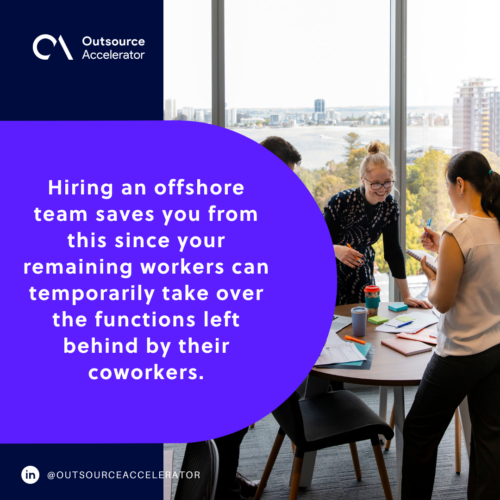Building an offshore team for successful outsourcing

Outsourcing gradually benefits your business when done right. Aside from the cost savings, it adds more value to your operations, making them more efficient.
There’s no single formula for successful outsourcing. However, having reliable people and flexible processes can increase your chance of success.
Many people experience nightmare stories in outsourcing to a single staff to look for “unicorns.” This is why industry experts such as Mike O’Hagan recommend building a small offshore team for their functions. Mike tackled this in episode 374 of the Outsource Accelerator Podcast with Derek Gallimore.
The pros of building an offshore team vs hiring a single “unicorn”
In his experience, Mike saw many startups “crash and burn” with a lack of teams to handle their work. The reason: they rely on “unicorns” to make their company grow.
While unicorn employees are ideal for a business, they cannot always be a fit for your company. Cultural unfit alone could cost you around 50% to 60% of their annual salaries, according to SHRM. This could even give you a negative outlook on outsourcing and the industry.
At the same time, unicorn employees could “get up and leave” once they get burned out and dissatisfied with their work.
On the other hand, building an offshore team already gives you a headstart in growing your operations. It provides you with the following advantages you cannot get with hiring a unicorn.
Avoid disruptions
When you rely on a single offshore staff, you could experience work disruption once they quit or become unfit for work.
Hiring an offshore team saves you from this since your remaining workers can temporarily take over the functions left behind by their coworkers.
Prevent burnouts
Having an offshore team helps you and your employees prevent burnout while working. You can assure that none of your employees will feel overworked since each task is distributed equally.
Lessen turnovers
Building an offshore team gives you a chance to create a good working environment for your employees. With this, you can increase their satisfaction, causing them to stay longer with your company and lessen your turnover rate.
See better results
You can see improvements in your functions better when you build an offshore team. Compared to hiring a single employee, you get to experience more efficient workload distribution and collaboration with a few people.
Expand more easily
Lastly, building a small team gives you a better foundation for your outsourced services. You can train future employees more easily since you already have an existing team to help you do this. As a result, you can scale and expand your departments easier.

Tips in building an offshore team
Mike believes that offshoring “will work for [a business] brilliantly” with the help of “people” and “training.” Here are a few tips for building an offshore team to achieve great results.
Start with a few employees
It’s best to start your outsourcing journey by hiring two or more employees. This move helps you divide your tasks into more people instead of relying on one staff.
At the same time, having a few people onboard helps you train and delegate services better in case you need to expand.
Hire and train people with less experience
Mike observed that training your offshore staff with less experience and strong core competency gives “more wages, [better] loyalty, and less staff churn.”
Businesses usually look for offshore staff with strong experience in certain fields. While they are skilled enough to get the job done, they might produce an output far from your expectations.
When you train people with less experience, you can teach them how to do a process and get the outcome you expect. As a result, you build more engagement with your offshore team.
Make your processes flexible
One of the mistakes you will make when outsourcing is having a rigid and fixed process to delegate.
Mike recommends companies create more flexible processes when outsourcing. According to him, businesses can retain at least “80% of the same way” while having room for experimenting with new ways to work.
Having flexible processes makes it easier for you to outsource your services anywhere in the world.
Find ways to encourage interaction
Mike iterated that outsourcing is not just about “[delegating] processes” to the team and “[standing] back” to observe. Instead, try to engage with your staff and make them a part of your operations.
Offshore employees want to feel like they are an extension of your business. Encouraging team interaction and collaboration is the best way to increase their productivity, satisfaction, and loyalty in the long run.
Try to get to know your team by organizing visits and virtual meetings with them periodically. You can even team them up with your in-house teams for a project or ongoing function.

Mike O’Hagan in helping clients outsource their services
Mike’s Business Tours helped hundreds of clients expand their knowledge on outsourcing and confidently move their services to the Philippines.
Mike organizes a three-day intensive tour in Manila and Clark to give businesses a closer look at how outsourcing works in the Philippines. Despite the pandemic, Mike continues to talk to global companies about offshoring and how it can help them scale better.
Through Shore360, meanwhile, Mike and his team help their clients find solutions for their outsourcing and offshoring needs.
Reach out to Mike through his email, [email protected], and LinkedIn account. Also, listen to episode 374 of the OA podcast here.







 Independent
Independent




